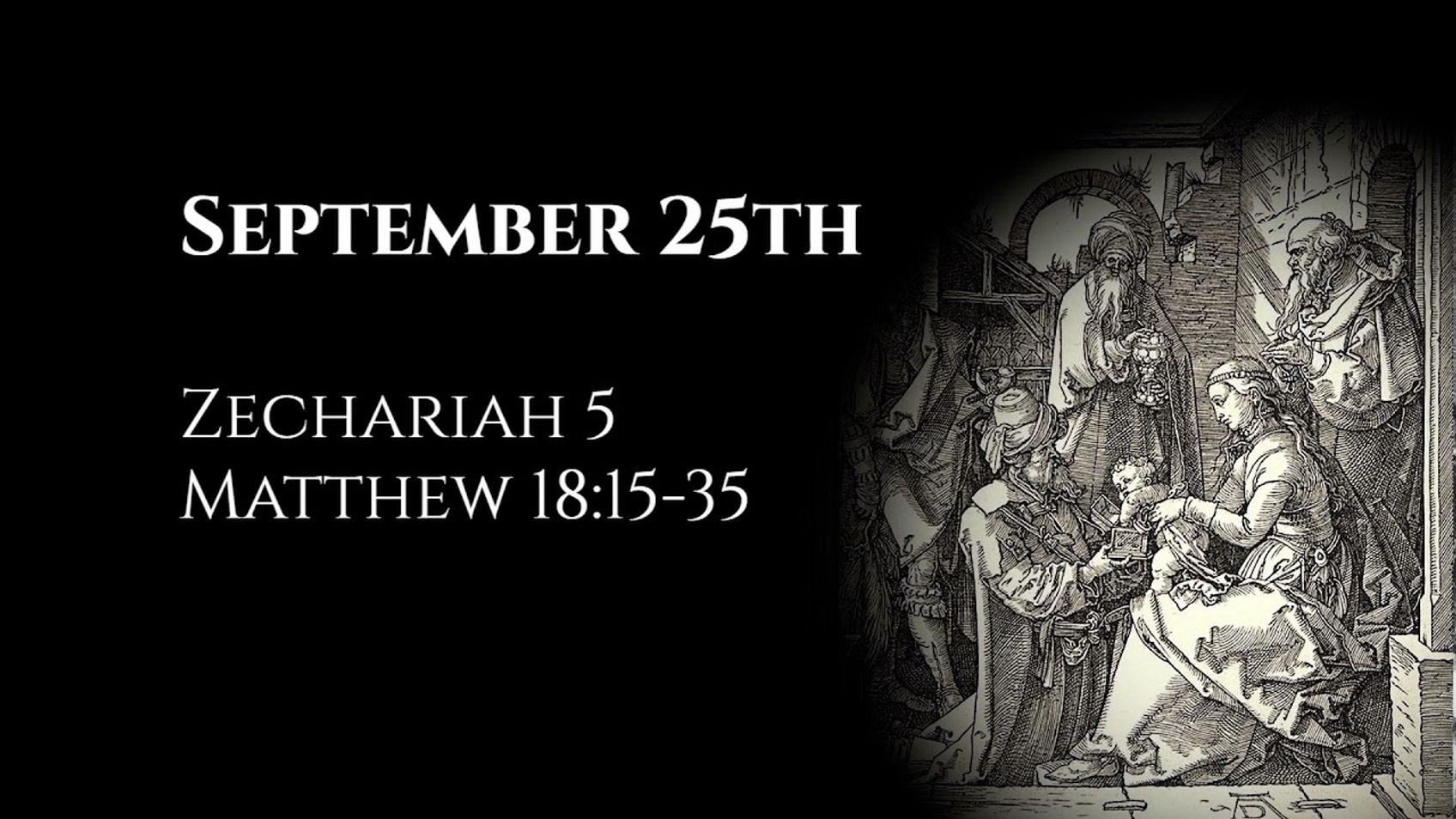September 25th: Zechariah 5 & Matthew 18:15-35
September 24, 2021

Alastair Roberts
The visions of the flying scroll and the woman in the ephah. The Parable of the Unforgiving Servant.
My reflections are searchable by Bible chapter here: https://audio.alastairadversaria.com/explore/.
If you are interested in supporting this project, please consider supporting my work on Patreon (https://www.patreon.com/zugzwanged), using my PayPal account (https://bit.ly/2RLaUcB), or buying books for my research on Amazon (https://www.amazon.co.uk/hz/wishlist/ls/36WVSWCK4X33O?ref_=wl_share).
You can also listen to the audio of these episodes on iTunes: https://itunes.apple.com/gb/podcast/alastairs-adversaria/id1416351035?mt=2.
More From Alastair Roberts
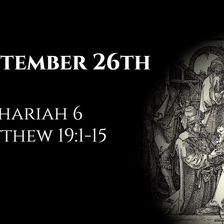
September 26th: Zechariah 6 & Matthew 19:1-15
Alastair Roberts
September 25, 2021
The vision of the chariots and the crowning of Joshua the high priest. Jesus teaches concerning divorce.
My reflections are searchable by Bible chapt
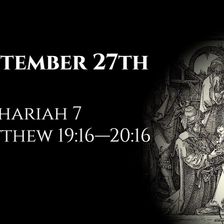
September 27th: Zechariah 7 & Matthew 19:16—20:16
Alastair Roberts
September 26, 2021
The fast of the fifth month. The rich young man and the labourers in the vineyard.
My reflections are searchable by Bible chapter here: https://audio
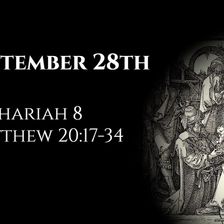
September 28th: Zechariah 8 & Matthew 20:17-34
Alastair Roberts
September 27, 2021
The coming peace of Jerusalem. Jesus foretells his death a third time.
My reflections are searchable by Bible chapter here: https://audio.alastairadv
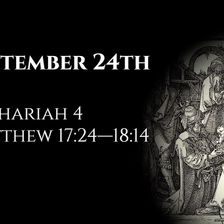
September 24th: Zechariah 4 & Matthew 17:24—18:14
Alastair Roberts
September 23, 2021
The vision of the lamps and the olive trees. Who is the greatest?
My reflections are searchable by Bible chapter here: https://audio.alastairadversar
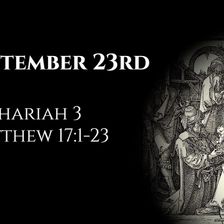
September 23rd: Zechariah 3 & Matthew 17:1-23
Alastair Roberts
September 22, 2021
Cleansing and reinstalling the priesthood. The Transfiguration.
My reflections are searchable by Bible chapter here: https://audio.alastairadversaria

September 22nd: Zechariah 2 & Matthew 16:13-28
Alastair Roberts
September 21, 2021
Jerusalem inhabited without walls. Peter's confession.
My reflections are searchable by Bible chapter here: https://audio.alastairadversaria.com/expl
More on OpenTheo

How Can I Explain Modesty to My Daughter?
#STRask
November 27, 2025
Questions about how to explain modesty to a nine-year-old in a way that won’t cause shame about her body, and when and how to tell a child about a pre

Conservatism and Religious Freedom with John Wilsey
Life and Books and Everything
October 27, 2025
What is conservatism? And why does it go hand in hand with religious freedom? How should we think about the American experiment of ordered liberty? Ha

What About Those Who Never Heard the Name of Jesus?
#STRask
December 22, 2025
Questions about what will happen to those who never heard of Jesus or were brought up in a different faith, whether there’s biblical warrant to think

Is It a Sin to Feel Let Down by God?
#STRask
November 6, 2025
Questions about whether it’s a sin to feel let down by God and whether it would be easier to have a personal relationship with a rock than with a God

What Is the Role of the Holy Spirit in Our Lives if He Doesn’t Give Us Instructions?
#STRask
February 23, 2026
Questions about the role of the Holy Spirit in our lives, advice for someone who believes in God intellectually but struggles to understand how to hav

How Should I Respond to an LGBTQ Person Who Says He Feels Good About Who He Is?
#STRask
March 2, 2026
Questions about responding to an LGBTQ person who says he feels good about who he is, and whether—since we all have sin in our life we don’t consider

How Can We Know Who Is Teaching the Same Gospel Paul Taught?
#STRask
February 16, 2026
Questions about how we can know who is teaching the same gospel Paul taught, and whether or not Jeremiah 1:5 supports the idea that we pre-existed in

Why Do We Say Someone Was Saved on a Particular Date If It Was Part of an Eternal Plan?
#STRask
November 24, 2025
Questions about why we say someone was saved on a particular date if it was part of an eternal plan, the Roman Catholic view of the gospel vs. the Bib

Can You Provide Verifiable, Non-Religious Evidence That a Supernatural Jesus Existed?
#STRask
November 10, 2025
Question about providing verifiable, non-religious evidence that a supernatural Jesus existed.
* I am an atheist and militantly anti-god-belief. Ho

The Making of the American Mind with Matthew Spalding
Life and Books and Everything
February 2, 2026
The United States is unique in how much attention it pays to its founding, its founders, and its founding documents. Arguably, the most famous and mos

Prove to Me That Jesus Is Not a Created Being
#STRask
January 26, 2026
Questions about why we should think Jesus is not a created being, and what it means to say God became fully human if part of being human means not bei

Are You Accursed If You Tithe?
#STRask
December 15, 2025
Questions about whether anyone who tithes is not a Christian and is accursed since Paul says that if you obey one part of the Mosaic Law you’re obliga

Why Is It Necessary to Believe Jesus Is God?
#STRask
February 19, 2026
Questions about why it’s necessary to believe Jesus is God, whether belief in the Trinity is required for salvation, and why one has to believe in the

What Tools of Reasoning Help You Know What’s True, Right, and Good?
#STRask
December 4, 2025
Question about what tools of reasoning help us determine whether something is true or false, right or wrong, good or bad before bringing Scripture int

Is It Possible There’s a Being That’s Greater Than God?
#STRask
February 5, 2026
Questions about whether it’s possible there’s a being that’s greater than God and that’s outside of God’s comprehension and omniscience, and how to ex
